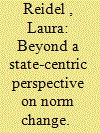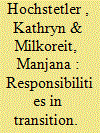|
|
|
Sort Order |
|
|
|
Items / Page
|
|
|
|
|
|
|
| Srl | Item |
| 1 |
ID:
138822


|
|
|
|
|
| Summary/Abstract |
This article argues that constructivist literature on norm diffusion could benefit from using a multilevel governance perspective. The case study is a retreat from the multicultural approach to governing state-minority relations in liberal democratic states, focusing on Canada and the Netherlands. It argues that, although actors at the national level may be retreating from the norms underlying this multicultural approach, this is not true of the substate and suprastate levels. Instead, in both countries, there is evidence of work at these levels to maintain these norms.
|
|
|
|
|
|
|
|
|
|
|
|
|
|
|
|
| 2 |
ID:
138818


|
|
|
|
|
| Summary/Abstract |
Natural resources are central to peacebuilding. International actors authorize United Nations’ sanctions to disrupt the trade in resources that fuel conflict. In the aftermath of conflict, international actors intervene to influence how natural resources are governed to ensure that resources contribute to postconflict recovery. This article examines international efforts to govern forests in Liberia and diamonds and minerals in Sierra Leone to better understand the extent to which natural resources have helped establish the underlying conditions for peace. It suggests that, despite reducing the likelihood that resource revenues will fuel conflict, a decade of natural-resource governance has made peacebuilding more challenging. Rather than foster cooperation and trust, governance interventions leave unaddressed historical sources of tension and create new sources of instability.
|
|
|
|
|
|
|
|
|
|
|
|
|
|
|
|
| 3 |
ID:
138821


|
|
|
|
|
| Summary/Abstract |
The UN asserts that local ownership boosts the legitimacy and sustainability of peacebuilding by preserving the principles of self-determination and nonimposition in an activity that can contravene them. At the same time, it also perceives local ownership to imperil the achievement of its operational goals, thus bringing its normative and operational obligations into conflict. This article evaluates the UN’s discourse and operationalization of local ownership, showing that despite the UN’s invocation of ownership discourse, it operationalizes ownership in restrictive ways that are intended to protect the achievement of operational goals but that consequently limit self-determination and increase imposition. Moreover, because of contradictions in the UN’s practices of ownership, it also undercuts its ability to realize the very operational goals that it is trying to protect.
|
|
|
|
|
|
|
|
|
|
|
|
|
|
|
|
| 4 |
ID:
138817


|
|
|
|
|
| Summary/Abstract |
The BASIC countries (Brazil, South Africa, India, and China) play an increasingly prominent role in global climate negotiations. Climate governance spotlights burden-sharing arrangements, asking countries to take on potentially costly actions to resolve a global problem, even as the benefits are generally indivisible public goods. This article examines the BASIC countries’ own Joint Statements and their individual and collective submissions to multilateral climate negotiations to identify the rationalist and principled arguments they have made about the climate burden-sharing requirements that developed countries, developing countries, and they themselves should face in global climate governance. It argues that their expectations for their own role are particularly unclear, with greater national action than international commitments to do so.
|
|
|
|
|
|
|
|
|
|
|
|
|
|
|
|
| 5 |
ID:
138819


|
|
|
|
|
| Summary/Abstract |
This article analyzes how low-income state agreement has been produced for contemporary international climate change treaties. These treaties have dramatically weakened the legal framework for action on climate change, with likely unequal impacts in the poorest countries. The case demonstrates that theories of international cooperation are not fully equipped to explain the processes through which low-income states offer their consent to multilateral agreements. This article develops and applies to this case a neoGramscian framework of negotiated consent, which reveals three mechanisms in the production of low-income state consent: material concessions, norm alignment, and structural conditioning. This approach views international cooperation as a process of strategic power relations coconstituted by strong and weak states, in coordination with nonstate actors. As such, it is useful for bridging the agent-structure divide prevalent in cooperation theory and sheds light on the durable nature of inequality in international governance.
|
|
|
|
|
|
|
|
|
|
|
|
|
|
|
|
| 6 |
ID:
138820


|
|
|
|
|
| Summary/Abstract |
State sovereignty is a fundamental organizing principle of international relations. Although always imperfectly respected, the sovereignty norm-set— territorial integrity, sovereign equality, and noninterference—carries enormous weight. It is not, however, static or monolithic, and this article seeks to historicize and contextualize sovereignty in the Global South by examining one of its essential components, the norm of noninterference. Making use of qualitative and quantitative evidence, it argues that the norm of noninterference, held sacrosanct in developing regions during the postdecolonization era, has eroded in important ways in Latin America and Africa as regional interference practices in response to domestic crises have gained legitimacy in the post–Cold War era. Noninterference has meanwhile been upheld and protected to a much greater degree in Southeast Asia.
|
|
|
|
|
|
|
|
|
|
|
|
|
|
|
|
|
|
|
|
|